An Interview with Chris White, RKC Team Leader
By Adrienne Harvey, SrPCC, RKC-II, CK-FMS
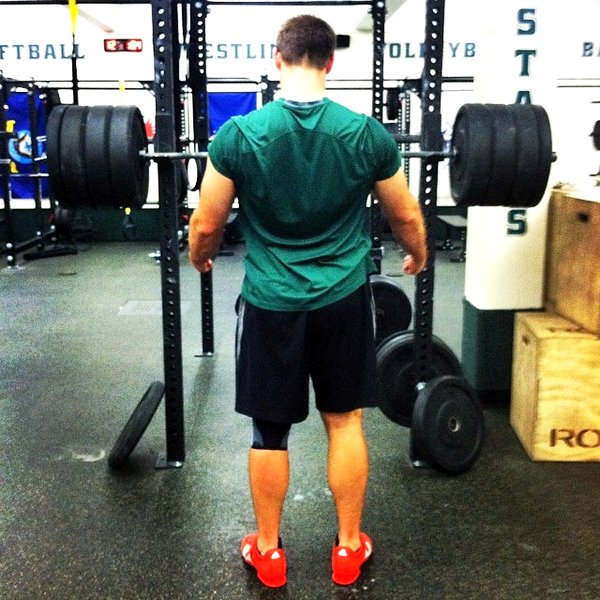
Dragon Door: How were you were originally introduced to kettlebells?
Chris White: In 2003, I was a freshman football player at Cal Poly and Dr. Chris Holder was my strength and conditioning coach. He’d gotten his
RKC certification and inserted kettlebells directly in to our strength program. I believe we were one of the first collegiate programs to really start using the kettlebells in our training and it made a huge impact on our season. As a starting defensive lineman on one of the winningest teams in Cal Poly history, I strongly believe our success had a lot to do with our kettlebell training.
Dragon Door: What did you study as an undergrad?
Chris White: I have an undergraduate degree in business and now a Masters in Kinesiology.
Dragon Door: Do you remember some of the specific kettlebell drills you felt were especially helpful for football?
Chris White: We swung a lot, but also used many other drills like pistols and presses. At the time I weighed 280lbs but was still able to do pistol squats. And we pressed the
heavier kettlebells a lot. We also did the snatch test just to see what we could do—only to find out later that it was part of the
RKC certification test. I was excited to find out I could do it!
Dragon Door: When did you go for your RKC, and what inspired you to do it?
Chris White: I was certified in 2010 at the San Jose RKC. Specifically I was going to be working with Dr. Holder at San Jose State when he was the head strength coach there. Then he moved back to Cal Poly and I have been working with him here for almost three years as an assistant coach. But before I became an assistant coach, I was doing
personal training. I knew how much kettlebell training had helped me as an athlete and thought it would be the perfect addition to my arsenal. I also just wanted to polish some of the things I was doing and learn some different cuing techniques. I had been swinging kettlebells for a long time, but now that I was coaching I wanted to lock down all the finer details of the movements.
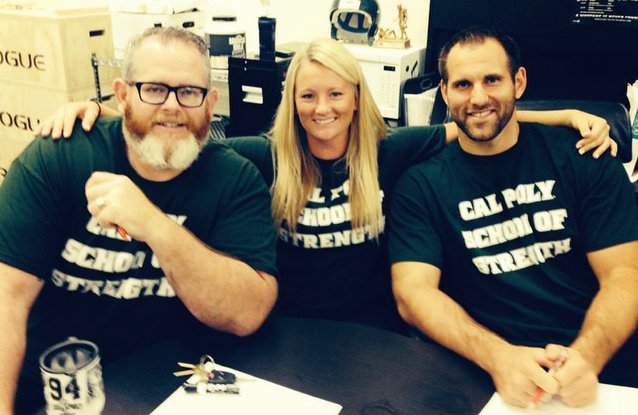
Dragon Door: Which teams or athletes are you coaching at Cal Poly?
Chris White: I specifically program for women's tennis, the track team and all the individual events of track and field—the throws, sprints, and cross-country. I also help program training for baseball and football. While working on my thesis, I was working with women’s volleyball and women's soccer.
Dragon Door: What did you learn from the study?
Chris White: Well, as the kettlebell world already knows,
Dr. Holder is a doctor of medical qigong and I really wanted to focus on recovery for my graduate study. I had considered several different recovery modalities, and Chris suggested we use qigong. I thought it was a great idea because it was extremely innovative and neither of us were aware that it had ever been studied this way. So, we got approval from the university and were able to use three of our teams for the study.
The study was based on a 10-week cycle. The first week was pretesting, the training cycle lasted for 8 weeks, then the last week was post-testing. We had two groups, the qigong group, and a control group. Everyone was on the same GPP program, but the qigong group also had 15 minutes of
qigong exercises for five days a week at 6AM. That was the only difference between the two groups. We not only measured strength gains, we also had everyone answer wellbeing questionnaires throughout the 10 weeks. We generally found statistical significance with the questionnaire and all four strength measures, however the qigong group had higher average strength gains in every strength movement and a higher average wellbeing score. Since we found significant differences, I’m going to use this study as a platform for more research—which I am already beginning!
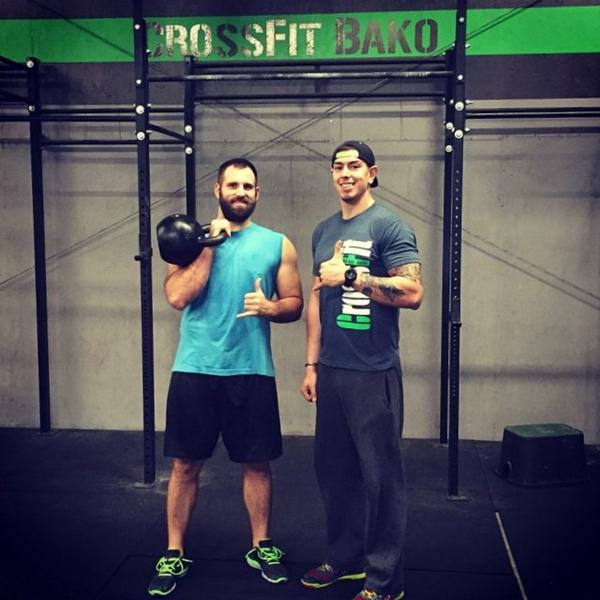
Dragon Door: What will you research next?
Chris White: Right now, I am gathering articles about different types of sleep. I want to see if qigong can make sleep more effective in short periods of time, if it strengthens the REM cycle, or can make it more effective—especially for athletes. Even for non-athletes, business and everyday life produces a lot of stress, and then with the addition of training, the body experiences even more stress. There isn't always enough time to recover, and since
sleep offers the best opportunity for recovery from daily life, it is imperative to make it a focus. However, life doesn't always go as planned. Sometimes we only have six hours or less of sleep. I’m hoping to find a relationship between qigong and sleep. If we can make sleep a little more effective with the right qigong practice, that may allow people to operate more effectively with a less than ideal amount of sleep.
Dragon Door: Do you practice qigong regularly?
Chris White: I do my own practice every day, and also at 11AM Monday through Friday with our athletes. I think it helps our athletes become the best version of themselves. It doesn't make them more skilled, because that comes from practice and from their coaches, but qigong makes their skills more efficient. For example, with their
kettlebell training, even if they’re stressed from work or school, qigong helps them focus more on their movement. They’re able to block out a lot of the other distractions in their lives and focus on the task at hand. Of course, this focus improves their performance and effectiveness of the swing or whatever movement they are practicing.
Dragon Door: What are some common threads in your kettlebell programming for all the different teams you’re working with?
Chris White: All of my teams do Turkish get-ups and then swings. When they are ready, I teach them kettlebell snatches—especially for any of the sports that go overhead. I really want to make sure they have the shoulder stability necessary for their sport. The snatch and get-up are great ways to develop that stability.
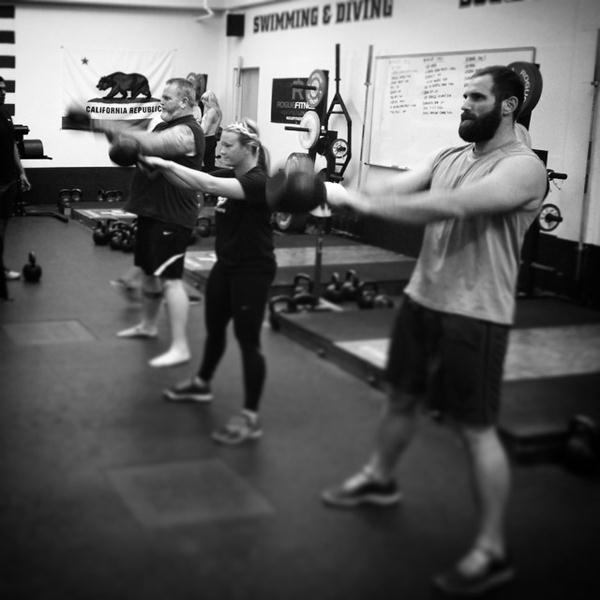
Dragon Door: When you first started training as a student at Cal Poly was there ever a time that you did not use kettlebells?
Chris White: Briefly during my freshman year and although our team was still successful, our real success came during my second year after we’d been training with them for the 2004 season. We could outrun any team on the field in the 4th quarter when normally people are exhausted. We would just run over teams at that point because of the extra conditioning the kettlebells gave us at the end of every workout.
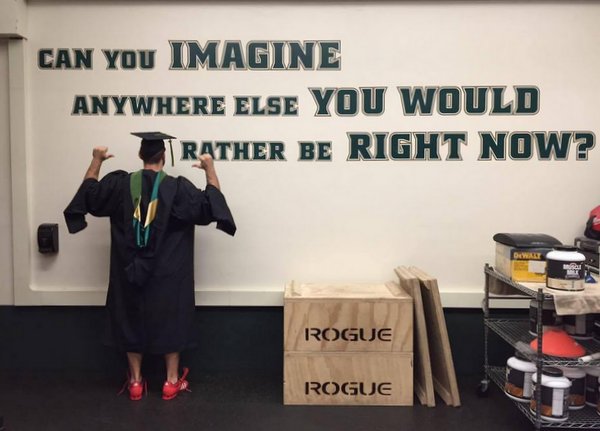
Dragon Door: What are some of your favorite kettlebell workouts?
Chris White: Right now we are using very simple workouts with our teams like 10 sets of 10 swings I-go-you-go with partners, or 5 sets of 20 swings I-go-you-go depending on their conditioning. I’m working with Andrew Read’s Gladiator Complex for my own training. It’s a fun one and uses double
24kg kettlebells, or two kettlebells at the weight you would use for the RKC snatch test. I also do this workout with a partner as I-go-you-go. It’s 10 double swings, then your partner does the same, then you do 8 double swings and 2 double cleans, then the partner goes, then 6 double swings, 2 double cleans, 2 double squats, next is 4 swings, 2 cleans, 2 squats, 2 presses, and then 2 swings, 2 cleans, 2 squats, 2 presses, 2 squats. That’s one round, and we go for 5 total rounds with a two minute rest between rounds.
Dragon Door: What's your favorite kettlebell movement?
Chris White: I am actually in the middle of the 3rd round of the 10k swing challenge right now, so of course the 2-arm swing is not one of my favorites right now because I'm doing about 460 of them each day! But I also really like to snatch. I think it's fun to feel the transfer of power from the swing to the transition over your head.
Dragon Door: What’s your favorite move to teach? I’ve found that many coaches like one drill, and enjoy teaching another one.
Chris White: My favorites to teach are the get-up, and the press. I like to teach the get-up because it’s so technical. We teach it by breaking it down into twelve steps so it’s easy for people to learn. Soon they move much better and many other aspects of their lifting improves. It really fills in any strength gaps that they may have.
Dragon Door: What will you bring to your role as an RKC Team Leader?
Chris White: I think the experience that I have working with all types of different athletes—collegiate and professional—my educational background and ability to work with a single client as well as large groups. And now, my background in research will be beneficial.
Dragon Door: What’s next in your career?
Chris White: I really want to keep doing more research—it's my passion. I want to focus on recovery because I think it's under-researched and underutilized. Most research focuses on performance or how to get big and strong. Not a lot of research focuses on how to recover from all that training. I would also like to get a PhD in the next couple of years.
Dragon Door: How did you become interested in recovery?
Chris White: When I was training as a pro football player in Santa Barbara, the program my trainers used with me was structured so that I didn’t have to run for conditioning. When I ran in training, it was solely used as technique work. With this program, I was in far better shape than the others going into camp. I thought that was incredible.
I was enthralled with the idea that I could do this type of training, recover and still be in better shape than anyone else while not needing to run. This idea got me interested in recovery. At first I experimented with different methods of programming and figured out that the answer was actually in using different recovery modalities.
Dragon Door: What do you like most about the RKC?
Chris White: I really enjoy the chance to continue teaching. The way that the RKC is structured now, there’s many more available opportunities for learning. Back at my 2010 RKC in San Jose there were so many people—80 or more—that it was like herding cattle. There were 15 people per group, 5 or more groups, and then we were getting beat down with the workouts. Now the workouts are still tough, that hasn't changed, but the quality of the coaching is through the roof. The opportunity to add to that knowledge from the research I do along with the ability to bounce ideas off all the
great instructors we already have is what I am most excited about.
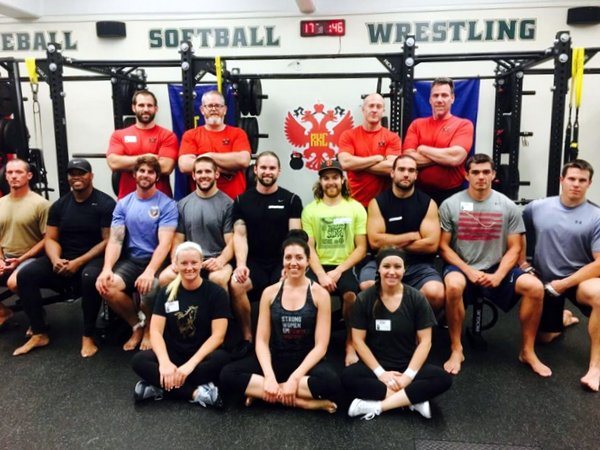
Dragon Door: What sort of results have your clients and athletes experienced by training with you? Or do you have a favorite success story?
Chris White: I have several, but want to talk about the most successful one first, since he had to do so much work. One of the first clients I trained with kettlebells could barely squat to above 90 degrees without pain in his knees. But after working with him on a lot of mobility exercises, he can now do a full goblet squat and can once again go up stairs without his knees hurting. We were able to take away his pain, and he didn’t need to have surgery—we used kettlebells to do it.
One of my current clients just passed her RKC. It became one of her goals after she saw how passionate I was about it. So, I trained her and gave her a program to specifically prepare her to pass the certification. I was so proud when she not only passed, but was recommended to assist! Of course she did all the work, and deserves all the credit, but I was really proud of how hard she worked and that she displayed such skill that she was recommended to assist afterwards. That was awesome.
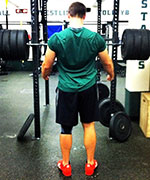 RKC Team Leader, Chris White, MS, is an assistant Strength and Conditioning Coach at Cal Poly, and can be contacted at whitecsw@gmail.com. Please mention RKC in the subject. You can follow him on Twitter: @DUBeastC.
RKC Team Leader, Chris White, MS, is an assistant Strength and Conditioning Coach at Cal Poly, and can be contacted at whitecsw@gmail.com. Please mention RKC in the subject. You can follow him on Twitter: @DUBeastC.
Back